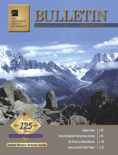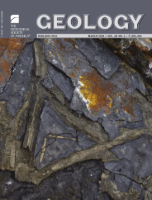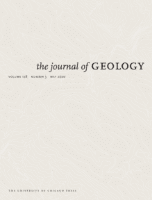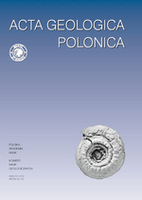
NORWEGIAN JOURNAL OF GEOLOGY
Scope & Guideline
Uncovering Geological Insights for a Sustainable Future.
Introduction
Aims and Scopes
- Seismology and Earthquake Studies:
The journal covers extensive research on seismic activities, including the history of earthquake stations and advancements in seismic processing and modeling. This focus highlights the importance of understanding seismic risks and geological processes in Norway. - Paleontology and Stratigraphy:
Research related to paleontological findings, stratigraphy, and sedimentary geology is a key scope, including studies of fossil records and stratigraphic profiles from various geological periods, particularly in Norway and surrounding regions. - Geomagnetism and Paleomagnetism:
The journal includes studies on geomagnetic phenomena and their historical implications, providing insights into the Earth's magnetic field changes over geological time and their impact on geological formations. - Sedimentology and Geomorphology:
There is a strong emphasis on sedimentological studies and the analysis of geological formations, including the processes that shape landforms and coastal geomorphology, particularly in the context of Norway's diverse landscapes. - Geochemistry and Petrology:
The examination of geochemical properties and petrological characteristics of various rock formations is another critical area, contributing to the understanding of mineral resources and geological history.
Trending and Emerging
- Climate Change and Environmental Geology:
There is an increasing focus on the implications of climate change on geological processes, including studies on landslides, debris flows, and sedimentation patterns influenced by extreme weather events, highlighting the relevance of geology in the context of environmental change. - Marine Geology and Coastal Processes:
Research related to marine geology, including studies of coastal geomorphology, sediment transport, and marine resource management, has gained traction. This trend reflects an increasing awareness of the importance of marine environments and their geological underpinnings. - Technological Innovations in Geosciences:
The integration of advanced technologies, such as 3D modeling and remote sensing in geological studies, is emerging as a significant theme. This trend underscores the importance of innovative methodologies in enhancing our understanding of geological formations and processes. - Interdisciplinary Approaches:
There is a notable trend toward interdisciplinary research that combines geology with other fields such as biology, archaeology, and environmental science. This reflects a broader scientific movement toward holistic approaches to understanding complex geological and ecological systems.
Declining or Waning
- Volcanology:
Research on volcanic activity and related geological phenomena has decreased, indicating a potential shift in focus towards other geological processes or a waning interest in volcanic studies within the Norwegian context. - Tectonics and Structural Geology:
Although still relevant, the emphasis on tectonic studies and structural geology has diminished, possibly as researchers shift towards more applied geological questions or interdisciplinary studies that incorporate tectonic principles into broader environmental contexts. - Historical Geology:
There appears to be a declining trend in papers focused specifically on historical geology, possibly reflecting a broader trend in geological research that prioritizes contemporary geological processes and their implications for climate change and resource management.
Similar Journals

DOKLADY EARTH SCIENCES
Connecting Researchers to Contemporary Earth ChallengesDOKLADY EARTH SCIENCES is a reputable journal published by MAIK NAUKA/INTERPERIODICA/SPRINGER, focusing on the dynamic field of Earth and Planetary Sciences. With an ISSN of 1028-334X and E-ISSN 1531-8354, this journal offers a platform for researchers to disseminate their findings and insights that contribute to our understanding of Earth systems over a continuous publishing span from 1998 to 2024. It currently holds a Q3 quartile ranking in the Earth and Planetary Sciences category, reflecting an emerging yet significant impact within its field, evidenced by its Scopus ranks where it stands at 123rd in general Earth sciences and 113th in miscellaneous Earth sciences. DOKLADY EARTH SCIENCES aims to bridge research gaps and foster collaboration among a diverse audience including researchers, professionals, and students committed to advancing knowledge in geoscience. The journal stands as a vital resource for those seeking to explore contemporary challenges and innovations within the realm of Earth sciences.

BULLETIN OF GEOSCIENCES
Transforming Knowledge into Action for a Sustainable FutureBULLETIN OF GEOSCIENCES, published by the prestigious Czech Geological Survey, stands as a pivotal resource in the fields of Earth and Planetary Sciences and Environmental Science. Since its inception in 2003, the journal has been committed to advancing knowledge through high-quality research, currently holding a commendable Q2 ranking in both disciplines. With its focus on diverse and innovative topics, BULLETIN OF GEOSCIENCES provides an essential platform for researchers, professionals, and students aiming to disseminate and access impactful studies. The journal is indexed in Scopus, ranking #78/195 in General Earth and Planetary Sciences and #110/233 in General Environmental Science, reflecting its significant contribution to academia. Publishing from Prague, Czech Republic, this journal invites contributions that illuminate the interactions between geological processes and environmental phenomena, ensuring an inclusive and accessible approach to crucial global issues.

INTERNATIONAL JOURNAL OF EARTH SCIENCES
Bridging Theory and Practice in Earth SciencesINTERNATIONAL JOURNAL OF EARTH SCIENCES, published by Springer, is a leading journal in the field of Earth and Planetary Sciences, distinguished by its Q1 quartile ranking in the 2023 category of Earth and Planetary Sciences (miscellaneous). With an ISSN of 1437-3254 and an E-ISSN of 1437-3262, this journal has been a pivotal platform for researchers, academics, and practitioners since its inception in 1996. The journal's focus encompasses a broad range of topics within Earth sciences, making it a vital resource for contributions that enhance our understanding of geological processes, climate change, and planetary dynamics. The impact factor reflects its high standards and the significance of the research it publishes, ranking it in the 74th percentile among its peers as per Scopus. Furthermore, the journal offers Open Access options, facilitating the global dissemination of groundbreaking research. The editorial team is committed to advancing knowledge in Earth sciences, serving as an essential reference for students and professionals looking to engage deeply with this dynamic field.

GEOLOGICAL SOCIETY OF AMERICA BULLETIN
Pioneering Insights in Geological Research Since 1890The Geological Society of America Bulletin (GSA Bulletin), with ISSN 0016-7606 and E-ISSN 1943-2674, is a premier scholarly journal published by Geological Society of America, Inc. Based in the United States, this journal has been a cornerstone of geological research since its inception in 1890, making significant contributions to the understanding of Earth sciences over more than a century. Recognized for its rigorous peer-review process, the GSA Bulletin currently holds a prestigious Q1 ranking in Geology, positioning it among the top 14 journals in Earth and Planetary Sciences in terms of Scopus ranking, reflecting the high quality and impact of the research it publishes. Researchers, professionals, and students alike benefit from its comprehensive coverage of geological topics, including sedimentology, volcanology, and paleontology, which supports the advancement of knowledge in the geosciences. While the journal is not open access, it continues to provide a vital platform for innovative research and critical discussions that shape the future of geology.

Swiss Journal of Geosciences
Connecting Researchers to the Heart of Earth ScienceSwiss Journal of Geosciences is a prestigious academic journal dedicated to advancing the field of geosciences, published by SPRINGER INTERNATIONAL PUBLISHING AG. Since its inception in 2007, the journal has established itself as a leading platform for disseminating high-quality research findings in various domains related to Earth and planetary sciences, achieving a notable Q1 ranking in Geology as of 2023. With a solid reputation reflected in its Scopus ranking of Rank #72/321, the journal stands in the 77th percentile within its category. Based in Switzerland, the Swiss Journal of Geosciences embraces an open access model, making it easier for researchers, professionals, and students worldwide to access vital geological research without barriers. The journal’s objectives include promoting interdisciplinary research and fostering insights that address both fundamental and applied geoscientific problems, ensuring it remains a crucial resource for those seeking to understand our planet’s dynamics. Engage with pioneering research and contribute to the vibrant community of geoscientists by exploring the impactful articles published within its pages.

GEOLOGY
Connecting Researchers to the Heart of Earth's ProcessesGEOLOGY, published by the Geological Society of America, Inc, is a premier journal dedicated to advancing knowledge, research, and discussion in the field of geology. With an ISSN of 0091-7613 and an E-ISSN of 1943-2682, this journal stands out with an impressive Q1 ranking in Geology for 2023, positioning it among the top journals in the realm of Earth and Planetary Sciences, specifically holding a remarkable rank of 11 out of 321, reflecting its 96th percentile status. This journal aims to publish innovative research articles that cover all aspects of geology, from tectonics and sedimentology to paleontology and mineralogy, offering invaluable insights for researchers, professionals, and students alike. Although not currently open access, GEOLOGY maintains a rigorous review process ensuring the quality and integrity of the research it publishes. For more than five decades, spanning from its inception in 1973 to the upcoming publications in 2024, GEOLOGY has been instrumental in shaping the geological discourse and continues to be a vital resource for the scientific community.

Russian Journal of Pacific Geology
Pioneering Research in Geology and BeyondThe Russian Journal of Pacific Geology is a pivotal resource in the realm of Earth sciences, published by PLEIADES PUBLISHING INC. With an ISSN of 1819-7140 and an E-ISSN of 1819-7159, this journal has established itself as a significant publication for researchers, professionals, and students who explore the intricate geology of the Pacific region. Covering a wide array of topics including Geochemistry, Petrology, Geology, Geophysics, Oceanography, Paleontology, and Stratigraphy, the journal's relevance is underscored by its categorization within Q3 quartile rankings across multiple disciplines in the 2023 metrics. Operating from the United States, its influential publications span from 2007 to 2024, attracting a diverse audience dedicated to advancing the geological sciences. Although not an open access journal, it serves as a valuable repository of knowledge, presenting original research, reviews, and critical discussions that enhance scholarly discourse. The journal is recognized within the global scientific community, addressing significant geological challenges while fostering collaboration and innovation among scholars in the Earth and Planetary Sciences.

JOURNAL OF GEOLOGY
Charting New Territories in Geological Research.The JOURNAL OF GEOLOGY, published by University of Chicago Press, serves as a premier platform for disseminating groundbreaking research in the field of geology. Established in 1973, this esteemed journal has consistently ranked in the Q2 category in geology, further solidified by its Scopus ranking, where it is positioned at 99 out of 321 in Earth and Planetary Sciences, marking it in the 69th percentile of its category. With an emphasis on innovative and interdisciplinary studies, the journal features peer-reviewed articles that contribute to the understanding of geological processes, earth materials, and environmental interactions. Although it does not currently offer open access, it facilitates broad access through academic institutions to reach a global audience of researchers, professionals, and students striving to advance the knowledge of Earth's history and dynamics. As a vital resource for the geology community, the JOURNAL OF GEOLOGY plays an essential role in fostering scholarly dialogue and advancing both academic inquiry and practical applications in geology.

ACTA GEOLOGICA POLONICA
Pioneering discoveries in geology and beyond.ACTA GEOLOGICA POLONICA is a distinguished journal published by the Polska Akademia Nauk, in collaboration with the University of Warsaw's Geology Department. Since its inception, it has served as a vital platform for disseminating innovative research in the field of Geology, reflecting a commitment to advancing scientific knowledge in Earth and planetary sciences. With an ISSN of 0001-5709 and an E-ISSN of 2300-1887, this journal provides a rigorous review process and is classified in the Q3 quartile for Geology as of 2023, indicating its growing influence in the discipline. Despite not being open access, the journal facilitates meaningful contributions that span a range of geological topics from fundamental research to applied sciences, thereby enriching the academic landscape. Researchers, professionals, and students alike are encouraged to engage with the valuable findings and discussions contained within its pages, which continue to shape the future of geological inquiry.

Austrian Journal of Earth Sciences
Innovating Insights in Paleontology and StratigraphyThe Austrian Journal of Earth Sciences, published by SCIENDO, is an esteemed open-access journal specializing in the disciplines of geology, paleontology, and stratigraphy. With an ISSN of 2072-7151, this journal has established itself as a significant platform for innovative research and scholarly communication in the earth sciences. Since its inception in 2007, it has continuously expanded its influence, achieving notable rankings in the Scopus database—#113 in Geology, #42 in Paleontology, and #21 in Stratigraphy, demonstrating its commitment to high-quality publications. The journal holds prestigious quartile rankings of Q1 in both Geology and Paleontology and Q2 in Stratigraphy as of 2023, reflecting its impact and relevance in the scientific community. Researchers and students alike are encouraged to explore and contribute to the evolving discourse within this dynamic field, as the Austrian Journal of Earth Sciences fosters collaboration and knowledge sharing across global platforms.